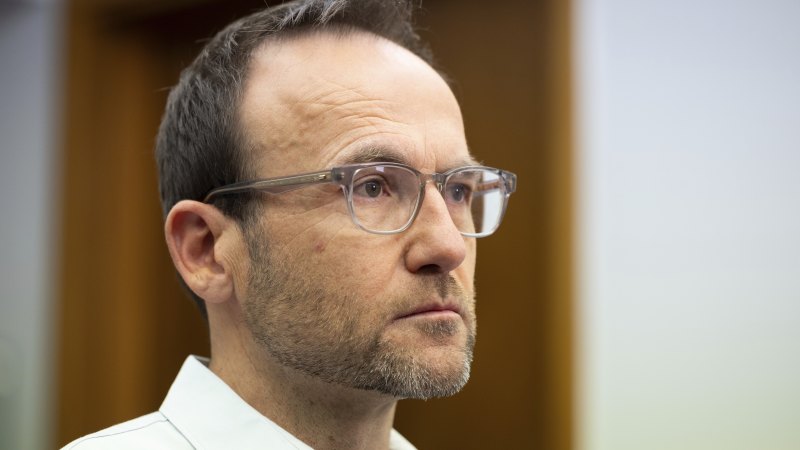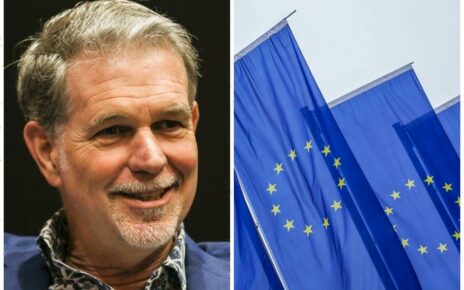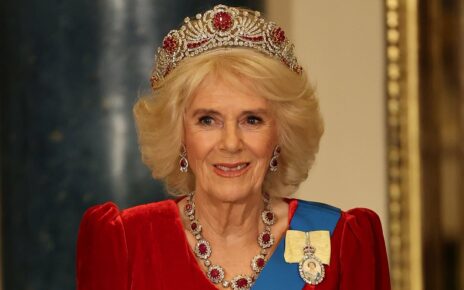Save articles for later
Add articles to your saved list and come back to them any time.
Greens leader Adam Bandt is stepping up his support for the Voice despite a call from his party’s Indigenous network to vote No or abstain on the referendum, widening an internal divide that has hampered the party’s ability to campaign for the change.
The Greens leader has promised “unanimous” support from Greens MPs to shore up support for the Voice in the final days of voting, while the party’s First Nations spokesperson Dorinda Cox has been one of the most active campaigners for Yes.
Greens leader Adam Bandt campaigns hard on the Voice but others in the party are silent. Credit: Alex Ellinghausen
But the Australian Greens First Nation Network, also known as the Blak Greens, has urged voters to reject the Voice or abstain in the referendum because the proposal is too weak, siding with former Greens senator Lidia Thorpe in her calls for a treaty.
Bandt has been campaigning in South Australia this week and will return to his Melbourne base on Thursday to work at polling booths, joining about 1500 supporters from the Greens who are helping the Yes campaign across Melbourne.
While most federal Greens have called publicly for a Yes vote and some have actively helped the Yes23 campaign, Victorian senator Janet Rice has not spoken in favour of the Voice on Facebook or X amid dozens of social media posts since the beginning of September.
The party’s Victorian state council has been unable to agree on a position on the Voice, although state MPs are in favour, after Blak Greens members opposed moves to back the Yes side during a meeting on August 10.
The Blak Greens argue within the party for sovereignty for First Nations people, with former ACT candidate Tjanara Goreng Goreng listed as a contact point for the group. She declined a request for comment.
The Greens are also divided on the Voice in NSW, where senators David Shoebridge and Mehreen Faruqi have spoken in favour but others are against or silent.
State MP Jenny Leong posted on Instagram two weeks ago that she supported the Greens’ position in favour of the Voice, but she has not posted on the issue on Facebook or X in recent weeks.
When supporters of the Voice marched in Sydney on the Walk for Yes gathering on September 17, they heard from Greens South Australian Senator Sarah Hanson-Young but not Leong, even though the march began in her state electorate of Newtown.
“Across the country, Greens supporters are showing the most enthusiastic support for Yes,” Bandt told this masthead.
“I’m hopeful that communities represented by the Greens will hear our vocal support for Yes, and will record among the highest support for change.”
Greens voters are the strongest supporters of the Voice compared to Labor and Coalition voters. The latest Resolve Political Monitor found that 80 per cent of Greens voters supported the Voice in a “yes or no” question using the same wording as the referendum ballot papers. This was based on responses from 4728 eligible voters surveyed from September 22 to October 4.
While some Greens members say the Voice is too weak and a treaty should take priority, the Resolve Political Monitor found this view was only shared by a small minority of voters.
The survey put a special question to voters who opposed the Voice – a subset of 2509 respondents – and found that 75 per cent thought the Voice went too far and only 5 per cent said it did not go far enough, with the rest unsure.
Greens officials defended Senator Rice and other federal MPs who have posted nothing or little about the Voice over recent weeks, saying Rice made a financial commitment that funded 100,000 Yes23 leaflets.
In a letter to members, the Blak Greens urged a No vote because there was no guarantee that creating a Voice would protect First Nations’ sovereignty, that it would progress treaty or truth-telling and that it was a powerless advisory body.
The group said it was impossible for “Labor’s voice to accurately represent the diversity of First Nations” and that the Voice would have no power, no authority, and no guaranteed way to influence any outcome.
Over the past four weeks, Tasmanian senator Peter Whish-Wilson has been one of the party’s strongest advocates for the Voice on social media, along with Penny Allman-Payne, Larissa Waters as well as Bandt, Cox, Hanson-Young and Shoebridge.
The Greens member for Brisbane, Stephen Bates, said he and his team had called hundreds of potential volunteers and hosted “phone banks” to call voters, as well as campaigning for months.
“I am committed to campaigning for as strong a Yes vote as possible in Brisbane and in Queensland,” he said.
“I’m personally doing several shifts at Brisbane City Hall pre-poll and calling hundreds of Yes23 volunteers across Brisbane to fill our polling day booth roster.”
The Greens member for the Queensland seat of Ryan, Elizabeth Watson-Brown, also said she had been door-knocking for the Voice and working on early voting booths.
While Greens MP Max Chandler-Mather has campaigned strongly on housing in recent weeks, he argued this did not mean he was ignoring the Voice.
“I’ve enjoyed campaigning for a Yes vote including flyering, attending rallies, helping out at pre-poll and other campaign activities,” he said.
A NSW Greens MP, who declined to comment on the record, said the vast majority of Greens party members supported the Voice.
“Anything that paints us as in the Dutton-style No camp would be wrong. We are for First Nations justice,” the MP said.
A federal Greens party source, who asked not to be named so they could speak freely, said the fact that some Greens were not campaigning had not been noticed in recent weeks and this meant the Greens were not being “punished for this disastrous campaign” in the same way as Prime Minister Anthony Albanese.
“The Greens will be able to genuinely say this is not on us. They were a clear Yes, the Yes rallies are full of Greens. The Greens have survived this by getting rid of Lidia when they did,” the federal source said.
Last month, this masthead revealed that some NSW Greens MPs and senators had barely campaigned at all for the Voice while others had been active.
The moves reveal the concerns among “progressive No” activists who initially rejected the Voice in favour of stronger action – such as a treaty first – but have moved away from the hardline stance taken by Thorpe.
Cut through the noise of federal politics with news, views and expert analysis. Subscribers can sign up to our weekly Inside Politics newsletter.
Most Viewed in Politics
From our partners
Source: Read Full Article



